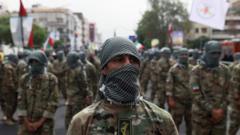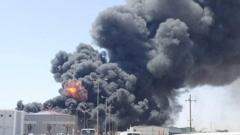Western intelligence agencies reveal that Iran has increasingly orchestrated plots to attack dissidents and critics globally, often employing criminal gangs for clandestine operations. The evidence points to the involvement of organized crime figures, exposing a complex web of violence linked to Iran's intelligence services.
Iran's Alleged Use of Criminal Gangs for Assassinations and Kidnappings Revealed

Iran's Alleged Use of Criminal Gangs for Assassinations and Kidnappings Revealed
Reports show a troubling connection between Iran's elite Revolutionary Guards and organized crime for executing hit jobs abroad.
According to recent reports from Western intelligence agencies, Iran has been implicated in a concerning pattern of plots targeting dissidents, journalists, and political adversaries abroad, escalating significantly since 2022. Notably, US intelligence has mentioned incidents where even former President Donald Trump was allegedly included among potential targets. Recently, several Iranians were detained in the UK under suspicion of plotting an attack directed at the Israeli embassy in London.
Court documents from Turkey and the US, obtained by BBC investigations, suggest that the Iranian regime has been engaging criminal organizations to carry out hits on foreign soil. Despite these allegations, Iranian officials have consistently denied involvement in such operations. One individual highlighted in these documents is Naji Sharifi Zindashti, an Iranian crime lord with a history of international drug trafficking.
Zindashti's name appears in connection with the 2017 assassination of Saeed Karimian, head of a Persian television network opposed by the Iranian government. Karimian was marked as a threat to Islamic values, leading to an in absentia prison sentence from an Iranian court prior to his murder. Turkish and US officials suspect that Zindashti’s networks played a key role in Karimian's assassination, and subsequent investigations linked him to another high-profile killing—Massoud Molavi, a defector from the Islamic Revolutionary Guard Corps (IRGC).
Investigative journalist Cengiz Erdinc noted an alarming trend where Zindashti’s associates tend to appear at the scenes of killings involving individuals at odds with the Iranian regime. Following his controversial release after being arrested for Karimian's murder, Zindashti fled to Iran, raising questions regarding his potential ties to Iranian intelligence operations.
Legal documents reveal that Zindashti was also involved in the 2020 abduction of Iranian dissident Habib Chaab, who was lured to Turkey and publicly paraded on Iranian state television before facing execution. In a disturbing twist, US court documents from 2021 detail a conspiracy where Zindashti allegedly enlisted members of the Hells Angels biker gang to carry out assassinations of Iranian defectors.
US and Israeli intelligence assert that the IRGC, particularly through its Quds Force, collaborates with international criminal syndicates like the Thieves-in-Law, an organization from the former Soviet Union, to conduct kidnappings and murders. A conviction in New York recently highlighted an illegal scheme to assassinate Iranian-American activist Masih Alinejad, reinforcing the growing threats posed by such plots.
In the wake of the US assassination of top IRGC commander General Qasem Soleimani in 2020, Iran's ambition to retaliate has reportedly intensified, with plots against former members of the Trump administration surfacing. Although Iran has firmly denied these allegations, the revelations have prompted the US and UK to impose sanctions against various individuals linked to Iran’s intelligence apparatus.
The situation in the UK indicates a rise in credible threats, with counterterrorism efforts revealing plots against Iranian expatriates and critics in the region. Investigators suggest the Iranian regime's reliance on criminal organizations allows for plausible deniability regarding their actions.
Historically, Iran has been accused of utilizing similar tactics, with an infamous incident in 1992 involving a terrorist attack on Iranian Kurdish leaders in Berlin that resulted in international backlash. Authorities stressed that infiltration efforts within these criminal networks are ongoing to counter these plots and protect potential targets from Iranian-backed violence.




















